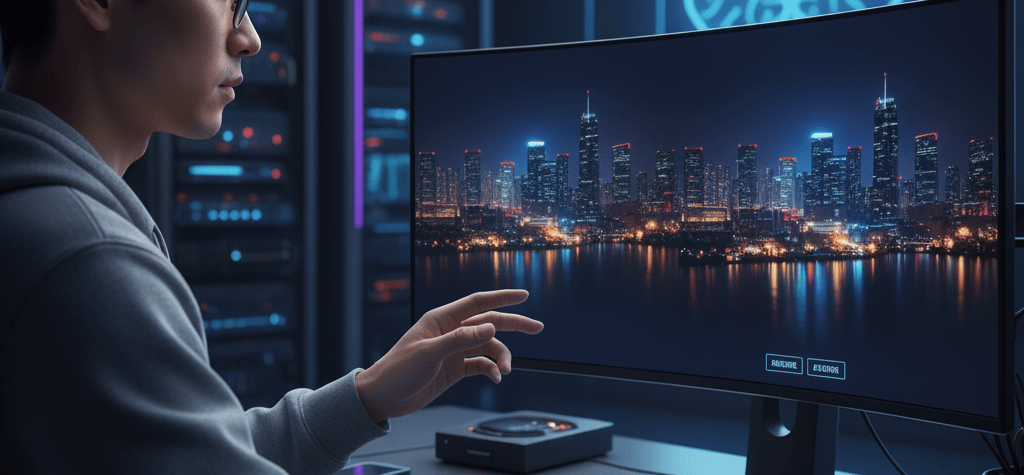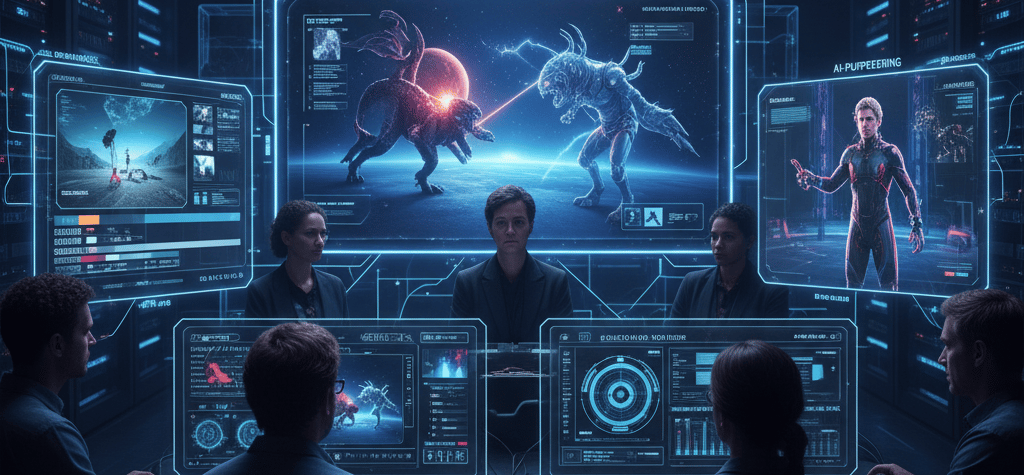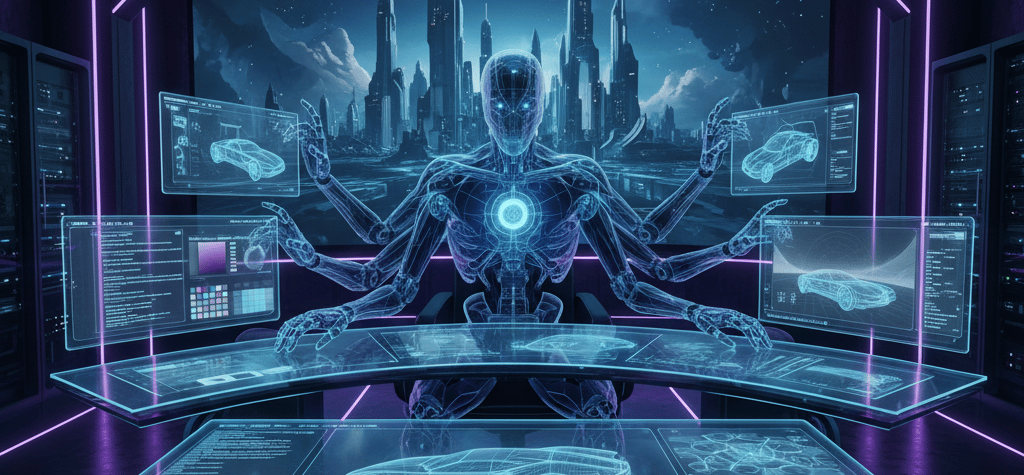Unlocking the Future of Filmmaking: How AI Video Enhancers Are Revolutionizing Your Footage
In the realm of filmmaking, a seismic shift is underway, powered by cutting-edge technology and innovation. Enter AI video enhancers—game-changing tools that are not only redefining how we create but also elevating the quality of our visual narratives. Imagine transforming your raw footage into breathtaking cinematic experiences with just a few clicks!
10/3/20257 min read


Unlocking the Future of Filmmaking: How AI Video Enhancers Are Revolutionizing Your Footage
In the realm of filmmaking, a seismic shift is underway, powered by cutting-edge technology and innovation. Enter AI video enhancers—game-changing tools that are not only redefining how we create but also elevating the quality of our visual narratives. Imagine transforming your raw footage into breathtaking cinematic experiences with just a few clicks! As creators grapple with the demands of an evolving audience and the pursuit of perfection, these AI-driven solutions offer unparalleled capabilities, enhancing clarity, color, and even the very essence of storytelling. From independent filmmakers to major studios, the potential to unlock stunning visuals and maximize production efficiency is revolutionizing the industry. Join us as we delve into how AI video enhancers are shaping the future of filmmaking, making it accessible and exciting for creators of all backgrounds. Embrace this technological revolution, and watch as your footage transcends the ordinary into the extraordinary.
The Evolution of Filmmaking Technology
Filmmaking has always been at the forefront of technological advancements. From the early days of black-and-white silent films to the vibrant, high-definition digital movies we enjoy today, the journey of cinematic technology is a testament to human ingenuity and creativity. The last century has witnessed a remarkable transformation in how stories are captured and presented on screen. Innovations like the introduction of sound, the transition from film to digital, and the advent of CGI have each left an indelible mark on the industry, continually pushing the boundaries of what's visually possible.
The digital revolution in the late 20th century marked a significant shift in the filmmaking landscape. The transition from analog to digital not only made the process of shooting and editing more efficient but also opened up a plethora of creative possibilities. Filmmakers could now experiment with visual effects, color grading, and editing techniques that were previously unimaginable. This democratization of filmmaking tools allowed independent creators to produce high-quality content without the need for exorbitant budgets, leveling the playing field and broadening the spectrum of cinematic voices.
Today, we stand on the brink of another monumental shift in filmmaking technology, driven by artificial intelligence (AI). AI has permeated various aspects of our lives, from personal assistants like Siri and Alexa to complex algorithms that power our social media feeds. In the realm of filmmaking, AI video enhancers are emerging as the next big thing, promising to revolutionize how we create and experience visual content. By leveraging the power of machine learning and advanced algorithms, these tools are capable of enhancing video quality in ways that were once limited to the imagination of filmmakers. As we delve deeper into this technological marvel, it's evident that AI is set to redefine the future of filmmaking, making it more accessible, efficient, and visually stunning.


Understanding AI in Video Enhancement
Artificial Intelligence, in its essence, refers to the capability of machines to mimic human intelligence and perform tasks that typically require human cognitive functions. In the context of video enhancement, AI utilizes machine learning algorithms to analyze, interpret, and improve video footage. This involves a complex interplay of data processing, pattern recognition, and predictive analytics, all working in tandem to enhance the visual quality of a video.
AI video enhancers operate by training on vast datasets of video content. These datasets contain examples of high-quality footage along with their lower quality counterparts. Through a process known as deep learning, the AI model learns to recognize the differences between these sets and develops the ability to upscale low-resolution videos, reduce noise, and enhance colors and details. The result is a transformed video that boasts higher clarity, sharpness, and overall visual appeal. This process, which once required specialized skills and sophisticated equipment, can now be achieved with just a few clicks, thanks to AI.
One of the most significant aspects of AI in video enhancement is its ability to adapt and improve over time. As the AI model is exposed to more data, it continually refines its algorithms, resulting in progressively better performance. This self-improving nature of AI ensures that the enhancements become more accurate and efficient with each iteration. Moreover, AI can perform these enhancements in real-time, providing immediate feedback and allowing filmmakers to make informed decisions during the shooting and editing phases. This level of precision and efficiency is unparalleled, making AI video enhancers an invaluable asset in the modern filmmaker's toolkit.


Benefits of Using AI for Filmmaking
The incorporation of AI video enhancers in filmmaking offers a myriad of benefits, fundamentally altering the production pipeline and enhancing the overall quality of the final product. One of the most notable advantages is the significant improvement in visual quality. AI-driven tools can upscale low-resolution footage to high-definition or even 4K quality, ensuring that every frame is crisp and detailed. This is particularly beneficial for filmmakers working with archival footage or content shot in less than ideal conditions. The ability to enhance video quality without reshooting saves time and resources, allowing creators to focus on other aspects of their projects.
Another critical benefit is the efficiency and speed that AI brings to the table. Traditional video enhancement techniques are labor-intensive and time-consuming, often requiring meticulous frame-by-frame adjustments. AI automates this process, delivering high-quality enhancements in a fraction of the time. This increased efficiency translates to faster turnaround times for projects, which is especially advantageous in the fast-paced world of film and media production. Additionally, AI tools are user-friendly and accessible, enabling even those with limited technical expertise to achieve professional-grade results.
AI video enhancers also open up new creative possibilities for filmmakers. By providing the ability to manipulate and enhance footage in ways that were previously unattainable, AI empowers creators to push the boundaries of their artistic vision. For instance, AI can be used to create hyper-realistic visual effects, seamless transitions, and dynamic color grading that enhances the storytelling experience. Furthermore, AI's predictive capabilities allow filmmakers to experiment with different styles and techniques, providing a sandbox for creative exploration. The fusion of human creativity and AI technology promises to usher in a new era of innovation in filmmaking, where the only limit is the imagination of the creator.
Popular AI Video Enhancement Tools
The burgeoning field of AI video enhancement has led to the development of several cutting-edge tools designed to cater to the diverse needs of filmmakers. Each of these tools offers unique features and capabilities, making them indispensable assets in the modern filmmaker's arsenal. Let's take a closer look at some of the most popular AI video enhancement tools currently available.
Leonardo AI is one of the leading names in the industry, renowned for its ability to upscale video footage with remarkable clarity and detail. Utilizing state-of-the-art machine learning algorithms, Leonardo AI can transform low-resolution videos into up to 8K quality. The tool excels in preserving the natural look of the footage, avoiding the artificial artifacts that often plague traditional upscaling methods. With its user-friendly interface and robust performance, Leonardo AI is a favorite among professional and amateur filmmakers alike.
Another prominent player in the field is Runway ML, enhances various aspects of video production, from automated editing and color correction to intelligent asset management. One of its standout features is the ability to analyze and tag video content, making it easier for filmmakers to organize and retrieve their footage. Additionally, Runway ML's advanced algorithms can detect and remove noise, stabilize shaky footage, and enhance overall video quality with precision.
Lastly, Imagine Art Video Enhancer AI is gaining traction for its powerful video enhancement capabilities. This tool leverages deep learning technology to upscale videos, enhance colors, and reduce noise, delivering high-quality results with minimal effort. Imagine Art Video Enhancer AI supports various video formats and resolutions, making it a versatile option for filmmakers working with different types of content. Its batch processing feature allows users to enhance multiple videos simultaneously, further streamlining the production process. With its combination of performance and ease of use, Imagine Art Video Enhancer AI is quickly becoming a go-to solution for video enhancement.
Conclusion: Embracing AI for the Future of Filmmaking
As we navigate the ever-evolving landscape of filmmaking, it's clear that AI video enhancers are poised to play a pivotal role in shaping the industry's future. The benefits they offer—ranging from improved visual quality and increased efficiency to expanded creative possibilities—are transforming how filmmakers approach their craft. By automating labor-intensive tasks and providing tools that enhance footage with unparalleled precision, AI is empowering creators to push the boundaries of their storytelling and bring their visions to life with greater fidelity and impact.
The democratization of filmmaking technology through AI also means that high-quality production is no longer the exclusive domain of big-budget studios. Independent filmmakers, content creators, and hobbyists now have access to powerful tools that enable them to produce professional-grade content. This democratization fosters a more diverse and inclusive filmmaking community, where voices from all backgrounds can share their stories and contribute to the rich tapestry of cinematic art.
Looking ahead, the potential for AI in filmmaking is limitless. As AI technology continues to advance, we can expect even more sophisticated and versatile tools to emerge, further enhancing the capabilities of filmmakers. The integration of AI with other emerging technologies, such as virtual reality and augmented reality, opens up exciting new avenues for immersive storytelling and audience engagement. By embracing AI and harnessing its transformative power, filmmakers can unlock new creative horizons and redefine the future of visual storytelling.
In conclusion, AI video enhancers represent a monumental leap forward in the world of filmmaking. They offer a glimpse into a future where technology and creativity converge to produce extraordinary cinematic experiences. As we stand on the cusp of this technological revolution, it's an exhilarating time to be a creator. The tools and possibilities at our disposal are more powerful than ever, inviting us to explore, innovate, and tell our stories in ways we never thought possible. So, embrace the future of filmmaking with AI video enhancers, and watch as your footage transcends the ordinary into the extraordinary.
Faceless Videos
© 2024. All rights reserved.
Photoreal 3D Walkthroughs
AI Video Tools
Text To Video
Image To Video
If you have any specific query regarding video making , lets connect .
Lifetime Deals
Realestate
Video Marketing
Lumalabs
KlingAI
